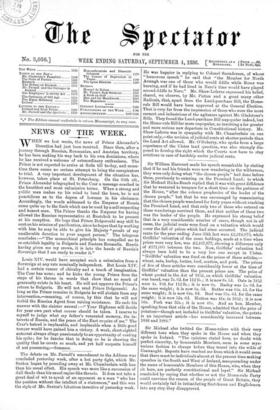Louis XIV. would have accepted such a submission from a
Sovereign at any rate nominally independent. But Louis XIV. had a certain veneer of chivalry and a touch of imagination. The Czar has none ; and he kicks the young Prince from the steps of his throne in words that show that no spark of generosity exists in his heart. He will not approve the Prince's return to Bulgaria. He will not send Prince Dolgoronki. As long as the Prince remains in Bulgaria he will abstain from any intervention,—meaning, of course, by this that he will not forbid the Russian Agent from raising resistance. He ends his answer with the sinister avowal :—" Your Highness will decide for your own part what course should be taken. I reserve to myself to judge what my father's venerated memory, the in- terests of Russia, and the peace of the East require of me." The Czar's hatred is implacable, and implacable when a little good temper would have gained him a victory. A weak, short-sighted autocrat always clings passionately to an opportunity of venting his spite ; for he fancies that in doing so he is showing the quality that he covets so much, and yet half suspects himself of not possessing,—firmness.


































